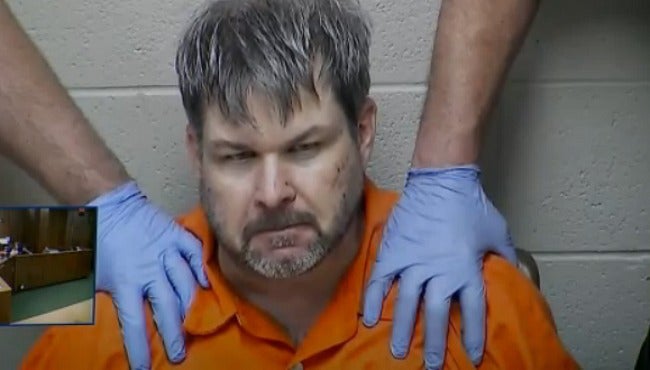Prosecutor: Kalamazoo shooting suspect to plead insanity
KALAMAZOO, Mich. (WOOD) – Defense attorneys plan to present an insanity defense for Jason Dalton, the man accused of murdering six people in the Kalamazoo area, the Kalamazoo County prosecutor said Monday.
“It wasn’t a surprise at all. This is where I expected the case to go from the very beginning,” Prosecutor Jeffrey Getting said at an afternoon news conference.
Dalton is accused of shooting and killing six people and seriously injuring two others at three locations in and around Kalamazoo on Feb. 20. He faces 16 criminal charges.
His defense team will try to demonstrate that he was legally insane at the time, meaning he was unable to understand the “wrongfulness” of his actions or to “conform his conduct” to abide by the law, Getting explained.
- RELATED: Dalton says Uber app took him over
Over the next 60 days, Dalton will undergo a psychiatric evaluation by the Michigan Center for Forensic Psychiatry. After the center puts forth a report, the state or the defense may request another independent evaluation. That could take another 45 days, Getting said.
A trial is tentatively expected to start in late September of early October, but that could change based on what happens with the evaluations, Getting said. The jury will have four options for a verdict: that Dalton was guilty as charged, that he is not guilty, that he is not guilty by reason of insanity or that he is guilty but mentally ill.
The forensic center already deemed Dalton competent to stand trial – but that means only that he’s capable of understanding the charges he faces and assisting in his defense. That decision has nothing to do with whether he was legally insane at the time of the shootings. However, Getting said, the center may use some of the information gathered during its competency interview as it investigates whether Dalton’s sanity.
“We know that he didn’t have any diagnosed mental illness prior to this incident,” Getting said. “I’m sure that they’ll rely on that information.”
After he was arrested, Dalton allegedly told detectives that he felt the Uber app on his phone had robbed him of sleep, manifested a “devil” that took over his body, and sounded to indicate who he should kill or not kill. During his competency interview, he said that “it almost seemed” like his phone could control him, according to the forensic center’s report. But he also said he no longer experiencing those problems.
If the forensic center finds Dalton was sane, he can still plead insanity. However, Getting said Dalton’s defense team will have to prove through a preponderance of evidence that he was insane and that it couldn’t that if a psychiatric evaluation said he was sane. The prosecution doesn’t have to prove Dalton wasn’t insane.
Getting said his office has handled several cases in which the insanity defense was put forth and that he thinks “we’re more successful than not” in getting convictions.
Last month during his preliminary hearing, Dalton made sudden movements toward one of his alleged victims, Tiana Carruthers, while she was on the stand. Dalton was hauled out of court and brought back to jail where he finished the hearing via video feed. A judge ruled there is enough evidence to send him to trial.
Getting said Carruthers would likely be called to testify again at trial. Abigail Kopf, the 14-year-old survivor of the shootings, may not be able to testify because of a medical condition caused by a gunshot wound to the head – but “we’ll see,” Getting qualified.
At Monday’s news conference, Getting said he was “not concerned at all” about Dalton’s behavior the next time he’s in court, either in terms of how his behavior may be interpreted by a jury or anyone’s safety.
“We’re well prepared for anything he might say or do the next time he’s in court,” Getting said.
He said that Dalton has the right to face his accusers, so he’ll likely start out the trial in the courtroom. If there is some sort of problem, Dalton will be warned. If he continues to be disruptive, he may be removed, as he was during the preliminary hearing.
Ahead of Monday’s news conference, there was an about 20-minute pretrial conference to give attorneys an opportunity to meet with the judge to discuss legal and procedural matters before a trial date was scheduled. Dalton was not in court for the conference.
